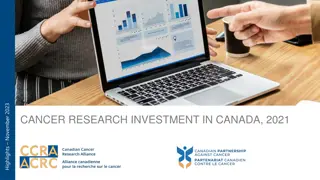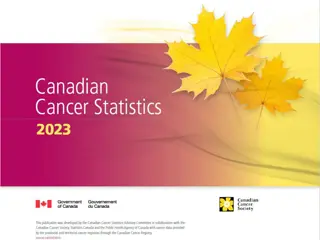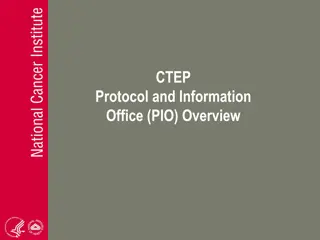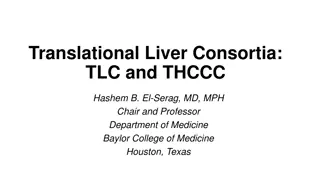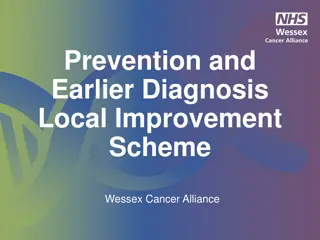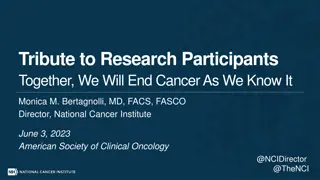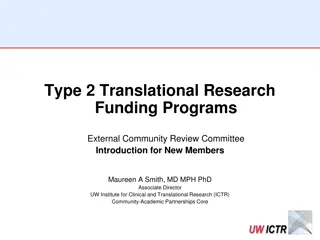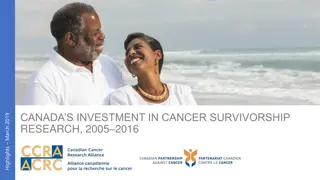Canada's Investment in Early Translational Cancer Research
The Canadian Cancer Research Alliance (CCRA) is a collaborative effort among various organizations in Canada to fund cancer research with a focus on translating discoveries into practical solutions. The alliance aims to accelerate the implementation of innovative findings from laboratory research to clinical trials for the benefit of cancer patients. This report highlights the importance of early translational research and the efforts made by Canadian funders to bridge the gap between bench and bedside in cancer research.
Download Presentation

Please find below an Image/Link to download the presentation.
The content on the website is provided AS IS for your information and personal use only. It may not be sold, licensed, or shared on other websites without obtaining consent from the author.If you encounter any issues during the download, it is possible that the publisher has removed the file from their server.
You are allowed to download the files provided on this website for personal or commercial use, subject to the condition that they are used lawfully. All files are the property of their respective owners.
The content on the website is provided AS IS for your information and personal use only. It may not be sold, licensed, or shared on other websites without obtaining consent from the author.
E N D
Presentation Transcript
1 Highlights December 2023 CANADA S INVESTMENT IN EARLY TRANSLATIONAL CANCER RESEARCH, 2005 2021
2 INTRODUCTION The CCRA is an alliance of organizations that collectively fund most of the cancer research conducted in Canada research that will lead to better ways to prevent, diagnose, and treat cancer and improve survivor outcomes. Members include federal research funding programs/agencies, provincial research agencies, provincial cancer care agencies, cancer charities, and other voluntary associations. Member are motivated by the belief that, through effective collaboration, Canadian cancer research funding organizations can maximize their collective impact on cancer control and accelerate discovery for the ultimate benefit of Canadians affected by cancer. The Executive Office is supported by the Canadian Partnership Against Cancer, funded by Health Canada to work with Canada s cancer community to implement the Canadian Strategy for Cancer Control to reduce the incidence of cancer, lessen the likelihood of Canadians dying from cancer, and enhance the quality of life of those affected by cancer. The Partnership is committed to enhancing the cancer research environment in Canada through its support of the CCRA and CCRA s role in coordinating the cancer research funding system. As a member and funder of the CCRA, the Partnership collaborates with other member organizations to enable the strategy for cancer research in Canada. Canadian Cancer Research Alliance
3 WHY REPORT ON THIS INVESTMENT? There is increasing emphasis on identifying ways to translate research and accelerate the speed at which the public start to benefit from research advances. Canada s cancer research funders are interested in identifying gaps and potential bottlenecks to early translational research as well as prospective solutions that will improve and expedite the implementation of innovative findings from bench to bedside and, where applicable, bedside to bench in this iterative process. For the purposes of this report, early translational research refers to research that confirms and advances discoveries into tangible modalities (pre-clinical) and tests modalities in the clinic (early phase clinical trials). Implementation research, which is designed to transfer clinical findings to practice settings and communities, is excluded from this report. 3 Canadian Cancer Research Alliance
4 RESEARCH TRANSLATION CONTINUUM [1] 4 Canadian Cancer Research Alliance
5 METHODOLOGY The Canadian Cancer Research Survey (CCRS) was the primary data source. This database contains over 30,000 research projects funded by 45 governmental and voluntary sector organizations/programs for years 2005 to 2021. Projects coded to CSO categories, Early detection, diagnosis and prognosis and Treatment, were all included and coded to the appropriate modality. Prevention and Cancer survivorship research was also included when the research involved a specific modality. Projects were classified using the TRWG-adopted framework on the following slide. Funding for major initiatives that supported networks or platforms for translational research were also included and stratified by modality category, not specific modality. Of note, data from the National Research Council Canada was excluded from the analysis because of a data gap for years 2011 to 2015, which affects the analysis when stratified by time periods. 5 Canadian Cancer Research Alliance
6 PROJECT CLASSIFICATION FOR EARLY TRANSLATIONAL CANCER RESEARCH [1] MODALITY RISK ASSESSMENT (RA) Research intended to characterize the cancer-related health status of an individual INTERVENTIVE (INT) PHASE Research intended to change the cancer-related health status of an individual via prevention or treatment PRE-CLINICAL [2] I. Agents (drugs & biologics) II. Immune Response Modifiers (immunotherapies) III. Interventive Devices (devices) I. Biospecimen- based (biomarkers) II. Image- based (imaging) CLINICAL [3] Centres, networks, and platforms that support risk assessment research - e.g., Ontario Cancer Biomarkers Network, BC Clinical Genomics Centres, networks, and platforms that support interventive research - e.g., BioCanRx, Canadian Cancer Clinical Trials Network (3CTN) MAJOR INITIATIVE [1] Adopted from E.T. Hawk et al. (2009). The Translational Research Working Group Developmental Pathways: Introduction and Overview. Clinical Cancer Research, 14(18), 5664 5671. [2] Includes all research from post-discovery to pre-clinical, where new modalities are created and tested using model systems. [3] Includes phases I, II, and II/III clinical trials and excludes phase III or later stage clinical research. 6 Canadian Cancer Research Alliance
7 REPORTING CONVENTIONS Cancer research investment refers to the direct funding of research projects that were administered by organizations contributing data to the survey. All projects had received some form of peer review. Investment for each project was based on a prorated calculation that assumes project dollars were paid out in equal monthly instalments in accordance with project start and end dates. Project funding was calculated for the period January 1, 2005 to December 31, 2021 and analyzed by three five-year periods (i.e., 2007 11, 2012 16, and 2017 21). Project budgets are weighted to reflect the extent of relevance to early translational cancer research and allocated to the relevant modality in the framework. 8 Canadian Cancer Research Alliance
8 CAVEATS Research undertaken by industry is not part of the CCRS and likely accounts for large investments in early translational research, particularly drug research. Hospital foundations and cancer research funders from outside of Canada are also funding sources for early translational research projects not captured in the report. Foundations with large research investments, such as those located in Ontario, Quebec and B.C. are a major omission. There are coding challenges in delineating phases of clinical trials and on ascribing relevance to early translational research. Project classification is reliant on the quality of the research descriptions provided by the funding organizations. 9 Canadian Cancer Research Alliance
9 A1. OVERALL INVESTMENT From 2005 to 2021, a total of $3.6 billion was invested in early translational cancer research. There were 12,025 projects with at least some early-stage translational research component. The substantive rise in the investment in 2009 was attributable to the ramp-up of the Ontario Institute for Cancer Research (OICR) as well as increased investment in infrastructure through major initiatives administered by the Canada Foundation for Innovation (CFI). The more recent increase (since 2018) was due to increased investment in equipment and other related supports as well as a slight increase in clinical research. Early translational research investment represented 33% of the overall cancer research investment in 2005 and 51% in 2021. The growth in investment from 2007 11 to 2017 21 was largely the result of increased investment in drugs and biologics (agents), biomarkers (biospecimen- based risk assessment), and immune response modifiers (immunotherapies). 10 Canadian Cancer Research Alliance
10 A2. OVERALL INVESTMENT Modalities (as per the classification) varied in terms of investment from period to period. Pre-clinical research formed the largest part of the investment regardless of modality and this was particularly the case for drug research. The largest investment in terms of major initiatives was for interventions, although this investment dramatically dropped from the first to the third period. Although not captured in the investment figures, biorepositories are key to supporting translational cancer research. 10 Canadian Cancer Research Alliance
11 ANNUAL INVESTMENT, 2005 2021 ($M) 300 250 200 231 214 150 231 172 236 188 170 194 142 150 180 180 181 115 100 82 102 85 50 71 64 61 60 53 51 49 46 45 44 43 39 37 33 33 32 29 0 2005 2006 2007 2008 2009 2010 2011 2012 2013 2014 2015 2016 2017 2018 2019 2020 2021 Major initiatives Grants/awards/equipment 12 Canadian Cancer Research Alliance
12 INVESTMENT BY MODALITY, 2005 2021 ($M) 80 INT-I. Agents 70 RA-I. Biospecimen- based 60 50 INT-II. Immune response modifiers 40 INT-III. Interventive devices 30 20 RA-II. Image-based 10 0 2005 2006 2007 2008 2009 2010 2011 2012 2013 2014 2015 2016 2017 2018 2019 2020 2021 Canadian Cancer Research Alliance
13 INVESTMENT BY MODALTY AND PHASE, THREE PERIODS ($M) 0 50 100 150 200 250 300 350 400 RA-I. Biospecimen- 2007-11 107 11 21 based 2012-16 201 18 23 2017-22 196 48 77 RA-II. Image-based 2007-11 58 11 42 2012-16 74 17 18 2017-22 70 11 12 2007-11 230 16 45 INT-I. Agents 2012-16 317 27 24 2017-22 282 36 60 response modifiers 2007-11 55 6 4 INT-II. Immune 2012-16 80 11 8 2017-22 138 33 41 INT-III. Interventive 2007-11 59 8 7 devices 2012-16 65 12 11 2017-22 54 13 29 Pre-clinical Clinical Equipment/related support 13 Canadian Cancer Research Alliance
14 INVESTMENT IN MAJOR INITIATIVES BY MODALITY FOCUS, THREE PERIODS ($M) 250 224 200 158 157 150 100 62 58 51 50 0 2007 11 2012 16 2017 22 INT. Interventive RA. Risk assessment Canadian Cancer Research Alliance
15 Canadian Cancer Research Alliance
16 B. ORGANIZATION-SPECIFIC INVESTMENT 41% of the 17-year investment in early translational research (including major initiatives) came from the Federal government sector and this investment grew substantively from the first to the third five-year period. All organizations covered in the CCRS had some investment in early translational research, be it research funding or supporting infrastructure such as biorepositories. However, the modality-specific investment was largely from a few funding organizations. In fact, 57% of the overall 17-year modality- specific investment was made by: Canadian Institutes of Health Research (CIHR), Ontario Institute for Cancer Research (OICR), Canadian Cancer Society (CCS), The Terry Fox Research Institute (TFRI) and the Natural Sciences and Engineering Research Council (NSERC). To access more information on the investments by funders, please consult our interactive visualization on the CCRA website. 16 Canadian Cancer Research Alliance
17 INVESTMENT BY FUNDING SECTOR, THREE PERIODS ($M) 600 567 500 441 373 400 314 295 291 275 270 300 206 200 156 110 100 100 0 Federal government organizations/programs Provincial government agencies/organizations Charitable organizations/associations Other partnered/leveraged funding 2007 11 2012 16 2017 22 17 Canadian Cancer Research Alliance
18 17-YEAR INVESTMENT IN MAJOR INITIATIVES BY ADMINISTRATING FUNDER (%) INTERVENTIVE RISK ASSESSMENT Genome Canada Other Other NSERC CCS OICR OICR CFI CFI NCE NCE Canadian Cancer Research Alliance
19 C. SITE-SPECIFIC INVESTMENT One dollar in every $5 invested in site-specific early translational cancer research over the 17 years was for research relevant to breast cancer. The increased investment in early translational cancer research from the first to the third five-year period (including major initiatives) was substantial for brain cancer ( $55M), leukemias ( $54M), breast cancer ( $36M), ovarian cancer ( $34M) and pancreatic cancer ( $28M). There were slight variations in the rankings of site-specific investments when stratified by modality. To access this information, please consult our interactive visualization on the CCRA website. 19 Canadian Cancer Research Alliance
20 17-YEAR SITE-SPECIFIC TRANSLATIONAL RESEARCH INVESTMENT BY CANCER SITE (%) Canadian Cancer Research Alliance
21 D. NOMINATED PRINCIPAL INVESTIGATORS In the 2017 21 period, there were 1,197 nominated (lead) principal investigators (PI) with at least one or more operating grant, career award, or equipment grant with an early translational research weighting of 100%. Sixty percent of these researchers were doing research on new drugs, including immunotherapies. 66% of the nominated PIs in the 2017-21 period were from Ontario or Quebec. Although most trainees are supported from diverse sources like provincial or institutional programs, internships or operating grants, a small group of trainees receive awards through the grant peer-review process. Over the 17 years, 2,619 trainees received funding for early translational research projects. Of these, 130 went on to receive grants as nominated PIs. The investment in trainee awards through national funding programs rose from the first to the third period. 21 Canadian Cancer Research Alliance
22 NOMINATED PRINCIPAL INVESTIGATORS BY MODALITY FOCUS, 2017 21 (N=1,197) (%) Both 26% Interventive 50% Risk assessment 24% Canadian Cancer Research Alliance
23 NOMINATED PRINCIPAL INVESTIGATORS BY PROVINCE, 2017-21 (N=1,197) 0 100 200 300 400 500 600 B.C. 150 Alta. 118 Sask. 32 Man. 46 Ont. 525 Que. 267 N.B. 9 N.S. 41 P.E.I. 1 N.L. 8 Canadian Cancer Research Alliance
24 TRAINEE AWARD INVESTMENT BY PROGRAM REACH AND LEVEL, THREE PERIODS ($M) Undergraduate Graduate Post-doctoral/Fellowship Undergraduate Graduate Post-doctoral/Fellowship National Regional 2007 11 2012 16 2017 22 Canadian Cancer Research Alliance
25 E1. INVESTMENT BY PROVINCE The research investment is based on the provincial affiliation of the nominated principal investigator. Provincial populations were used to normalize the research investment data. The highest per capita investments for the 17-year period were found in Ontario, British Columbia, and Quebec. Principal investigators (PI) in these provinces were most often the nominated PIs who received funding for major initiatives. 23 Canadian Cancer Research Alliance
26 E2. INVESTMENT BY PROVINCE There were modality-specific differences. In 2017 21, the per capita investments exceeded the national average for: B.C. and Ontario for drugs and biologics (agents) Ontario for immunotherapies (immune response modifiers) Ontario for devices (interventive devices) Ontario and B.C. for biomarkers (biospecimen-based risk assessment) B.C., Ontario and New Brunswick for imaging (image-based risk assessment) 23 Canadian Cancer Research Alliance
27 17-YEAR PER CAPITA INVESTMENT IN EARLY TRANSLATIONAL CANCER RESEARCH BY PROVINCIAL AFFILIATION OF NOMINATED PRINCIPAL INVESTIGATORS $10.00 $9.00 $8.00 $2.14 $7.00 $6.00 $1.15 $5.00 $4.00 $1.29 $0.15 $6.92 $3.00 $4.99 $0.36 $2.00 $3.86 $3.36 $0.53 $1.00 $2.07 $1.91 $1.57 $1.36 $0.47 $0.32 P.E.I. $0.00 B.C. Alta. Sask. Man. Ont. Que. N.B. N.S. N.L. Modality Specific Major Initiative Canadian Cancer Research Alliance
28 FURTHER INFORMATION A brief electronic report, Canada s Investment in Early Translational Cancer Research, 2005 2021, and an interactive dashboard are available at http://www.ccra-acrc.ca. Production of this report was made possible through collaboration and financial support from the Canadian Partnership Against Cancer Corporation and Health Canada. The impetus for the original early translational research analysis came from Dr. Victor Ling, founding President and inaugural Scientific Director of The Terry Fox Research Institute, and recognizes the organization s pioneering role in support of early translational research in Canada. Questions about this project should be directed to the CCRA Program Manager at info@ccra-acrc.ca. 25 Canadian Cancer Research Alliance
www.ccra-acrc.ca @CCRAlliance linkedin.com/company/canadian-cancer-research-alliance/ info@ccra-acrc.ca Canadian Cancer Research Alliance



